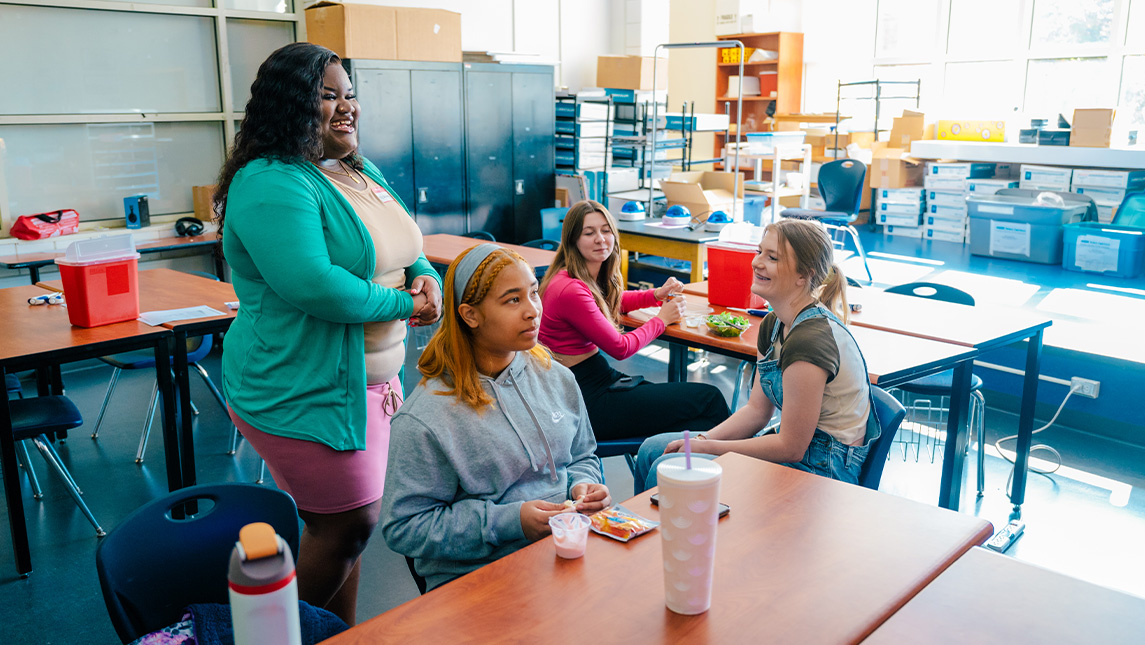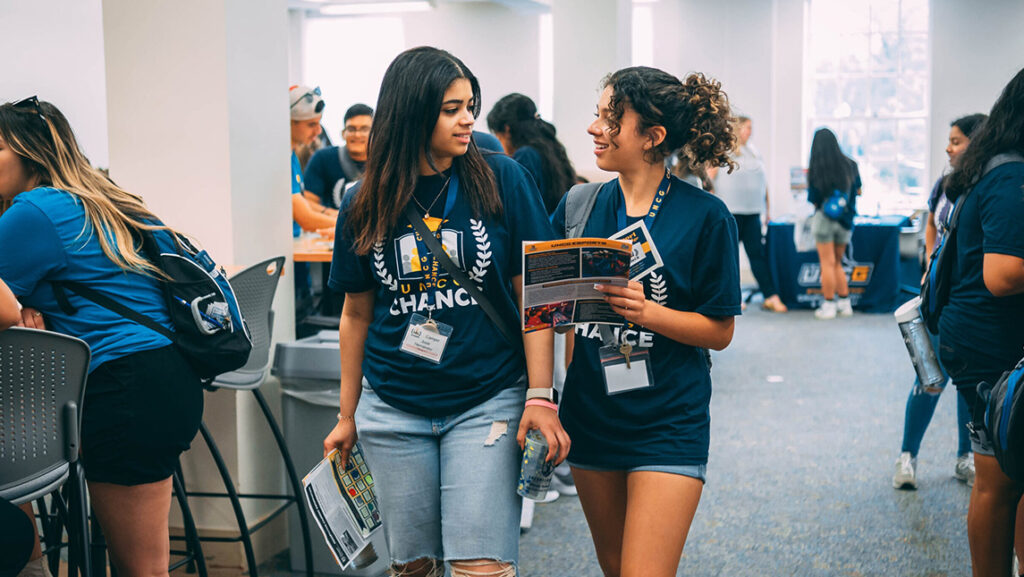Making a remarkable, real-world impact is at the center of UNC Greensboro’s school social work licensure program.
“Our students get lots of touch points throughout the entire bachelor of social work program with volunteering, community service, and then their formal internship,” says associate professor Beth Webb, who works directly with the school social work licensure students. Prior to coming to UNCG, Webb was a licensed school social worker for seven years.
A LINK TO THE COMMUNITY

Students wanting to earn a special subject area licensure in school social work, along with their bachelor of social work degree, apply to the licensure concentration during their third year. The social work program is through the School of Health and Human Sciences, while the licensure is part of the School of Education.
If admitted to the undergraduate school social work concentration, students intern at a public school in their fourth year. By the time they graduate, they have 440 hours of experience with an on-site supervisor. Most students complete their internship with Guilford County Schools – a unique opportunity with the mix of urban and rural communities in the district.
“The students are very surprised by the level of skill you need for the job, and they’re usually very impressed with their supervisors and the way they handle difficult situations,” says Webb. “It’s a hard job.”
A school social worker differs from a school guidance counselor, but the two professionals can work together. School social workers typically focus on needs such as poverty, food insecurity, homelessness, and mental health. They also work on truancy issues among students – getting to the root cause of a student’s absence.
“School social workers are the link to the community and the link between the school, families, and community,” says Webb.
Once a student earns their bachelor of social work degree with a school social work licensure, they are prepared for a full-time job as a school social worker.
DREAMCATC(HER)

Ai’Yonna Williams is the president of the UNCG Social Work Student Organization and is currently interning with the school social worker at the Middle College at UNCG. Williams says the experience has been challenging but rewarding.
“I’ve learned to adapt to new environments and to be more open to things changing,” says Williams, who is in her third year, but is graduating early in May 2024.
Her dream is to get a master’s degree and eventually start an outside therapy program for Black children and their families. Williams is already working toward that dream by creating a group for girls at the Middle College at UNCG called The DreamcatcHERS. Through the group, she helps young girls gain confidence and self-esteem, while discussing issues like mental health, hygiene, professionalism, and body image. while discussing issues like health, hygiene, and body image.
“I know mental health and therapy can be overlooked Iin the African American community,” says Williams, who is studying for a minor in human development and family studies. “I want to bring that vulnerability out in African American individuals and give those therapy services to families.”
FORMING A CONNECTION
Wendy Castro, a fourth-year social work major with a minor in psychology, was drawn to the program because of her own experiences with a school social worker.
“I was in middle school when I started seeing a social worker and they would help me and my family out with basic needs like food insecurity. That experience inspired me because it showed me someone with compassion for their community,” Castro says.
Castro is interning with the Henderson Newcomers School in Greensboro, which serves recently arrived immigrant and refugee students in third through eleventh grade who are novice English speakers.
“It’s fast paced and can be difficult because there’s just so much going on in the world right now,” says Castro. “But it helps me understand the children and their families’ perspectives. I really enjoy the kids and how they all come together and collaborate because it feels different than a traditional school.”
Connecting the families with American society is another part of Castro’s role, something she says she’s well-suited to do.
“I understand their lives to an extent,” she says. “I was born in the U.S., but my family is very traditional when it comes to Hispanic culture. Once I step outside of my house, it’s a completely different world and that’s how these students feel right now.”
MORE THAN A LECTURE

Like Williams, Castro has her sights set on a master’s degree. UNCG’s Joint Master of Social Work Program offers two full-time options: a two-year degree or an accelerated degree. At UNCG, students are only able to get licensed as a school social worker through the two-year program.
Jean Wegger ’12 ’15 JMSW earned her bachelor of social work from UNCG in 2012 and then her social work master’s degree in 2015. Now, she’s a full-time social worker at Southeast Middle School and Joyner Elementary School in Guilford County.
“During my sophomore or junior year of college, I knew I wanted to work with kids in a helping profession,” Wegger says. “I took an introduction to social work class and had this moment where I knew it was something I could see myself doing.”
It was her internship in the master’s program that helped set her up for success, along with her field supervisor, now professor, Beth Webb.
“That internship prepared me, but so did the writing in the school social work classes – the challenges that we put ourselves through, working with others, and learning to interact with people who are different than us,” says Wegger.
Williams and Castro also credit Webb with helping them find their way to the school social work program.
“The way that she speaks about her experiences is really encouraging because you can just tell how rewarding it was, and the passion she has for her career reflects on how she teaches the material,” Castro says.
Castro transferred to UNCG from a community college and says the option to become licensed in school social work was a large factor in her decision since she was able to take her education immediately into the real-world and make an impact on the community around her.
Story by Avery Craine Powell, University Communications
Photography by Sean Norona and David Lee Row, University Communications




